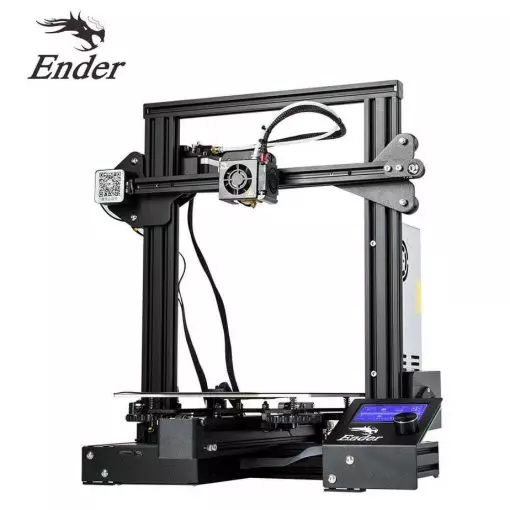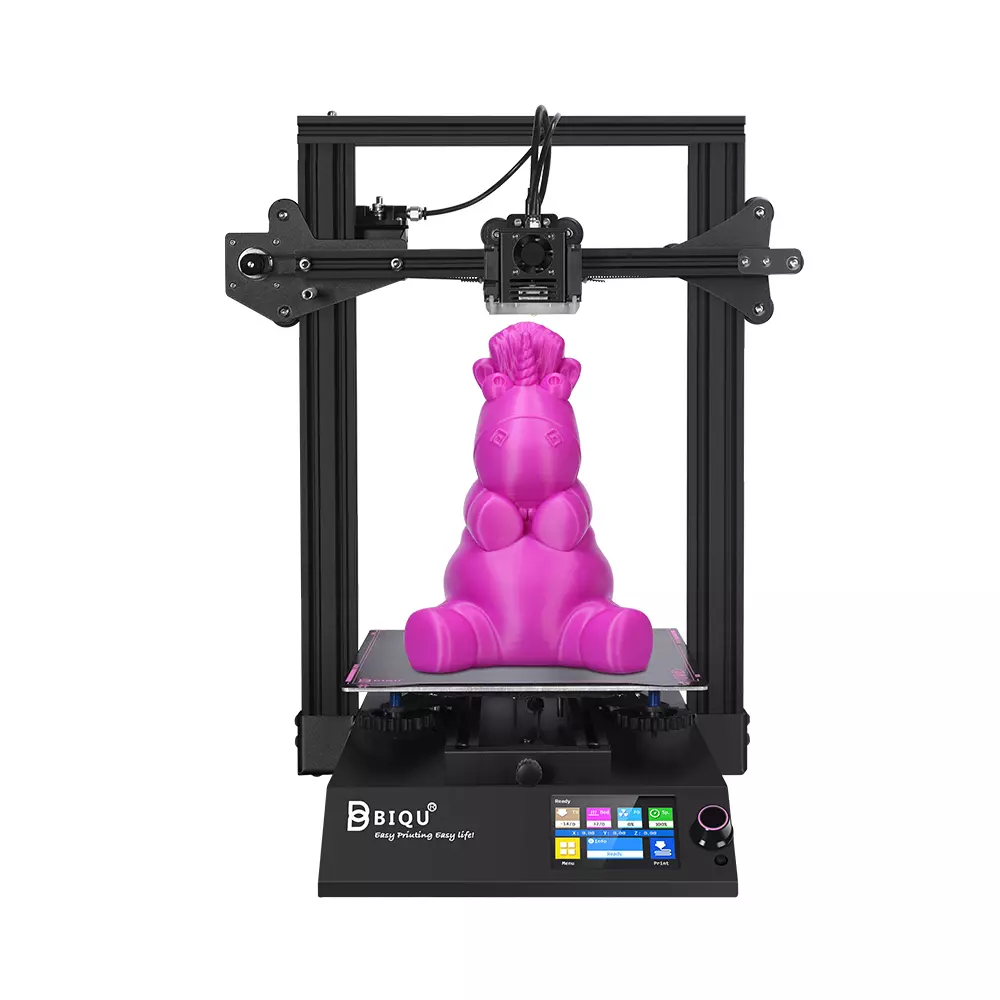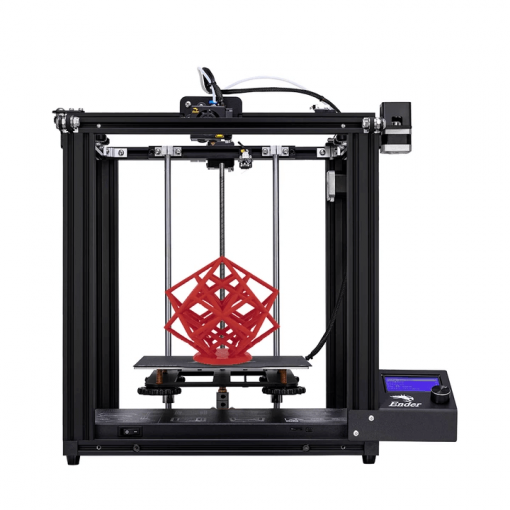Compare Ender 3 vs BIQU B1 vs Ender 5
Comparison between the best 3D printers
Choose the best 3D printer at the best price. The cheapest 3D printers are here.
Buy a 3D printer here with 3D Fila.
 |
 |
 |
|
| Model | Ender 3[BUY Ender 3] |
BIQU B1 |
Ender 5[BUY Ender 5] |
| Printing Material | Filament | Filament | Filament |
| Estimated price | $210,00 | $269,00 | $399,00 |
| Fabricante | Creality 3D | BigTreeTech | Creality 3D |
| Release Year | 2018 | 2020 | 2020 |
| Print Volume [mm] | 220x220x250 | 235x235x270 | 220x220x300 |
| Printer Size [mm] | 440x440x465 | 412x402x492 | 485x510x552 |
| Weight [kg] | 6,62 | 8,00 | 11,8 |
| Power Loss Recovery | NO | YES | YES |
| Enclosed printer | NO | NO | NO |
| Bed Leveling | Manual | Manual | Manual |
| Filament End Sensor | NO | YES | NO |
| Bed type | Heated | Heated | Heated |
| Power supply system | Bowden | Bowden | Bowden |
| Standard nozzle | 0,4 | 0,4 | 0,4 |
| Maximum Nozzle Temperature [°C] | 255 | 250 | 255 |
| Maximum Bed Temperature [°C] | 110 | 100 | 100 |
| Maximum printing speed [mm/s] | 180 | 100 | 180 |
| Filament holder | YES | YES | YES |
| Camera for supervision | NO | NO | NO |
| Recommended filaments | PLA, TPU, ABS, PETG | PLA, TPU, ABS, PETG | PLA, TPU, ABS, PETG |
| Recommended slicers | Cura, Simplify, Slic3r | Cura, Simplify, Slic3r | Cura, Simplify, Slic3r |
| Maximum Resolution [mm] | 0,1 | 0,1 | 0,1 |
| Processor | 8 bits | 32 Bits BTT SKR V 1.4 | 32 bits |
| Display | Mono | Touchscreen TFT 3,5'' | Mono |
| Power Supply | 24V / 270W | 24V / 360W | 24V / 360W |
| Connectivity | SD / USB | SD / USB | SD / USB |
| Operating systems | Windows, Mac, Linux | Windows, Mac, Linux | Windows, Mac, Linux |
| Date of registration in the system | 2021-04-13 | 2021-04-14 | 2021-04-15 |
| Release date | 2018 | 2020 | 2020 |
| Extra features | The Ender 3 V1 is a DIY assembly 3D printer, a sales leader since 2017, standing out for its cost-benefit. With a wide printing capacity, it has a CNC machined structure for precision and stability. It offers high-precision prints with low noise, thanks to its innovative V-profile and pulleys. It has a self-adhesive magnetic platform for easy removal of models and excellent adhesion. The Ender 3 heats up quickly, reaching 100°C in 5 minutes, ideal for agile prints. It includes protection against power failures, allowing you to resume printing after interruptions, saving time and material. | The BIQU B1 is an advanced 3D printer with a silent 32-bit BTT SKR V1.4 motherboard and ARM Cortex-M3 CPU, offering DIY interfaces (I2C, SPI, WiFi) and dual Z-axis. Its dual BTT B1 TFT35 V3.0 operating system allows real-time monitoring and multiple printing modes, including G-code visualization effects. It stands out for its BIQU SSS (Super Spring Steel), ensuring easy model adhesion and simplified removal, with the possibility of using it on both sides. It includes a filament sensor, automatically pausing printing in case of filament breakage. The multicolored RGB lights integrated into the hotend allow you to view the printing status even at night. Additional notes include the need for a BIQU-specific Type-C cable and extra interfaces for smart filament sensor and BL Touch. | Crealitys Ender 5 stands out with a solid frame and a larger 220 x 220 x 300mm print volume. Its assembly is simple and quick, offering high print quality and speeds of up to 80mm/s. With a magnetic bed, it makes it easy to remove prints. Notable for being hackable and expandable, the Ender 5 continues Crealitys innovative tradition in the affordable 3D printer market. Equipped with a 350W/24V Meanwell power supply, it heats up quickly, in addition to having efficient cable management and modified Marlin firmware. Its unique design includes dedicated stepper motors for each axis and smooth movement on the Y axis, providing more consistent and detailed prints. |
| Support for multiple colors and materials (AMS and CFS) | NO | NO | NO |
Notes * |
|||
| Cost-benefit | 6 / 10 | 7 / 10 | 7 / 10 |
| Hardware | 0.5 / 10 | 2 / 10 | 1.5 / 10 |
| Screen | . | . | . |
| Print volume | 3 / 10 | 3 / 10 | 3 / 10 |
| Performance | 1 / 10 | 1 / 10 | 1 / 10 |
| [BUY Ender 3] | [BUY Ender 5] |
Conclusion |
| In comparing the Ender 3, BIQU B1, and Ender 5 3D printers, each model presents its unique advantages and cost considerations tailored to different user needs. The **Ender 3**, recognized for its affordability and solid performance, offers a commendable print volume and efficient heating capabilities. Although it lacks advanced features like power recovery and filament end sensors, its simplicity and reliability make it a popular choice for hobbyists and newcomers to 3D printing. The **BIQU B1** stands out with its advanced 32-bit processor, dual Z-axis support, and silent operation, catering to users who prioritize technology and enhanced functionality. The inclusion of a filament sensor adds convenience, preventing interruptions during prints. The BIQU B1 is ideal for those who are willing to invest a bit more for added features that streamline the printing process and enhance user experience. Finally, the **Ender 5** combines a larger print volume with a robust and stable design, making it suitable for a variety of printing projects. While it comes at a higher price point, its performance and features like efficient cable management and quick heating are beneficial for users who require more capacity and reliability in their 3D printing endeavors. In conclusion, the Ender 3 is excellent for budget-conscious users seeking a reliable starter model, the BIQU B1 is suitable for tech-savvy users looking for advanced features at a mid-range price, and the Ender 5 is best for those who need a larger build size and are willing to invest more for superior performance. Ultimately, the best choice will depend on individual priorities like budget, intended use, and desired features. |

